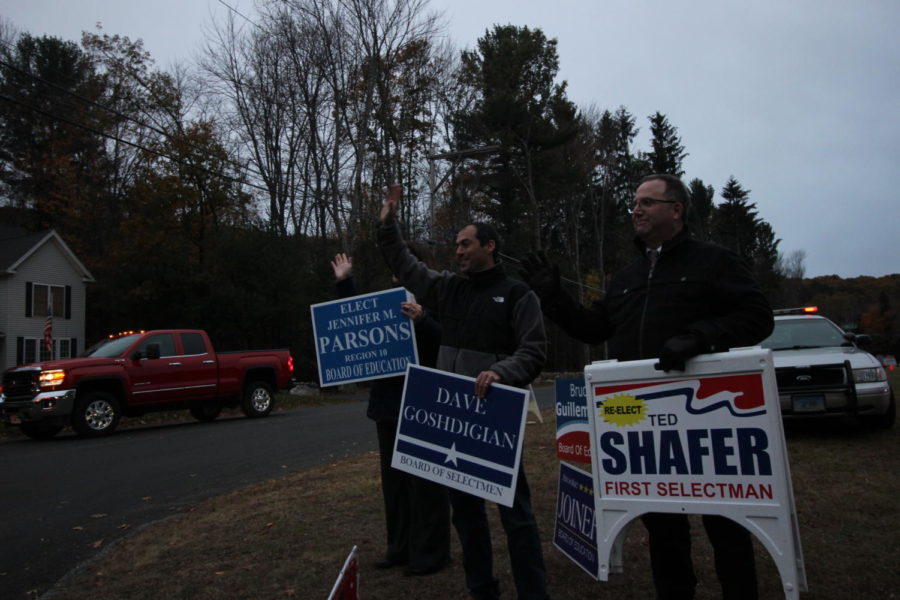State financial crisis weighs heavily on local elections
Burlington incumbent wins re-election
November 27, 2017
Two weeks before the 2017 Burlington municipal election, candidates for the Board of Selectmen and First Selectmen of Burlington gathered in the Lewis Mills auditorium to address the public’s questions and concerns. Economic issues dominated the televised event, which was sponsored by the Friends of the Burlington Public Library and moderated by Tom Monahan, a retired NBC 30 news correspondent.
The auditorium barely filled up halfway. Approximately 50 people attended, in sharp contrast to Burlington’s 6,337 eligible voters. Of these eligible voters, 2,234 showed up at the polls on Election Day.
The candidates discussed a range of topics from business developments to road closures, but the main theme of the night was economic concerns.
Monahan began the question and answer session with the highly anticipated concern, “How will the state financial crisis affect Burlington and what do you plan to do about it?”
Ted Shafer, a Democrat who ran for and won his third term as First Selectman, replied, “The financial goals will be to maintain the town services and Region 10 education operations. Currently, 75 percent of tax dollars go to support Region 10 (schools), and the remaining go to town services… capital projects will be deferred appropriately.”
Shafer received 1,386 votes. His challenger, Republican David Bereza, garnered 819.
Bereza, a former member of the Board of Selectmen, responded with ambitious plans for a more financially secure town. He announced, “I’ll work with (State Senator) John Piscopo and other state leaders to get a fair budget passed with Burlington’s best interests in consideration. We’ll make sure that central services are provided and the town is run properly… I’ll work with the Board of Finance to find ways to save money and make sure our town’s needs are met in the future and fruitless spending is eliminated.”
Many instances throughout the debate, Bereza brought up plans to improve the economy in Burlington, promising that “I will focus on growing our business tax base, so we’ll not have to worry about depending upon the state for funding, because this funding will not be here in the future.”
Addressing the issue of Region 10 losing significant funding, David Goshdigian, who ran for Board of Selectmen and lost as a Democrat, said, “l think the Board of Selectmen needs to work together with the Board of Finance and Region 10 to collaborate and find that balance between the needs of our town and the needs of our children. I like that Region 10 has taken affirmative steps and anticipated the cuts and put into place a three-tier plan already to save money.”
In contrast, Republican Douglas DiPaola, previously on the Planning and Zoning Commission who also ran for the Board of Selectmen and lost, took a more aggressive approach towards the Board of Education’s actions. He found fault in Region 10’s lack of definitive action in response to the state budget.
He repeatedly found fault in the Board of Education’s fiscal decisions, saying, “I would think that, especially, in financially trying times, one would need to budget. The school needs to budget. That’s what’s been lacking, and that’s what I’m going to push for on the town level, as well as in the Region 10 budget.”
The heated debate certainly revealed a desire for change, at least in the fifty or so people gathered in the auditorium. But the low attendance at this event points towards a lack of interest in local politics outside of the few people who did attend. Katryna Tribuzio, a senior at Lewis Mills who cannot vote, says, “I do not interest myself in local politics.” This apathy towards local elections results in low voter turnouts and re-elections year after year.
Burlington’s voter turnout, however, increased slightly this year. The last municipal election, which occurred in 2013, had a voter turnout of 31.73 percent, compared to this year’s 35.25 percent, according to the Office of the Connecticut Secretary of State Denise W. Merrill. The turnout in Burlington was slightly higher than the 29.97 percent overall Connecticut turnout.
Gabrielle Catorze, a senior at Lewis Mills, voted for the first time on Nov. 7. She recognizes the importance of civic engagement even in a small town, saying “”I think that if we ever want to see a change we need to make a change ourselves.”
Catorze took steps to be an informed voter: “I talked to the candidates when they came door-to-door. My mom is very informative about this stuff, she goes to all the Board of Education meetings; she’s president of the Lake Garda PTA.”
Asked why there were many reelections, Gabby replied, “I didn’t know a lot about the new people, just because I don’t know them. Some are new to town and we just haven’t gotten to know them yet.”
It can be difficult to stay civically informed, especially in a small town like Burlington where the candidates aren’t extensively covered by the media. But Burlington’s increasing turnouts seem promising for an increasingly civically engaged future.
